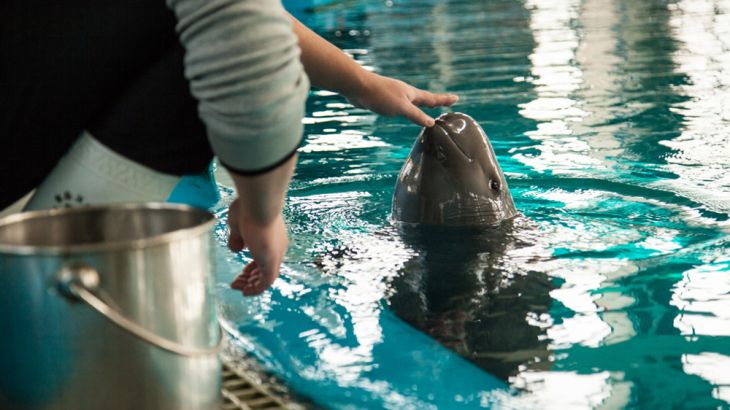
Sweden’s Green Port; Yangtze Porpoises & Leftover Cafes
A port reducing shipping emissions; saving China’s Yangtze porpoise; and a ‘pay-as-you-feel’ junk food cafe goes global.
Gothenburg’s Green Port
Ninety percent of world trade is transported by ships at sea. Traditionally this has been considered a greener method of transport than road or air, but toxic pollution from ships kills tens of thousands of people every year.
Keep reading
list of 4 itemsAfter the Hurricane
World’s coral reefs face global bleaching crisis
Why is Germany maintaining economic ties with China?
The Port of Gothenburg, Scandinavia’s busiest shipping hub, is pioneering a number of methods to mitigate the effects of pollution from ships.
From plugging ships into onshore green energy supplies so they do not have to burn fuel whilst in dock, to pioneering a new ‘sniffer’ technique which monitors passing ships’ sulphur emissions.
Nick Clark travels to Sweden to see how the Port of Gothenburg is cleaning and greening its act and laying down the environmental gauntlet to other ports around the world to clean up our sea air.
Saving the World’s Only Freshwater Porpoise
The increased urbanisation along China’s mother river, the Yangtze, has caused its deterioration over the years. As one of China’s most important waterways, cargo ships as well as passenger boats navigate its channels and over the last 50 years, there has been a 73 percent increase in pollution levels in the main stem of the Yangtze River.
Indeed, some parts of the river have such heavy traffic and pollution that it is hard to imagine anything still living in its waters.
But lurking in the murky waters are 1,000 or so Yangtze Finless Porpoises. This is in a big part due to the great work of individuals and groups who dedicate themselves to the cause of saving these animals. One of the leading figures in this conservation effort is Professor Wang Ding, a senior researcher who has helped implement successful conservation projects like the Tianezhou Oxbow Lake Natural Reserve.
Join Diane To as she travels along the Yangtze River meeting the conservationists working hard to save the world’s only freshwater porpoise from extinction.
British Leftover Cafe Goes Global
Every year around one-third of the food that we grow worldwide never makes it to the dinner table. That is about 1.3bn tonnes of perfectly edible produce that is being discarded. And it is not just the food that is going to waste, it is the energy and the land and the resources that it took to grow it in the first place.
Adam Smith’s ‘Real Junk Food Project’ in the UK intercepts this food to serve at his ‘pay-as-you-feel’ Leeds-based cafe. Located in the deprived area of Armley it serves up everything from spicy lentil soup to beef goulash to its customers, some of whom might not otherwise be able to afford to eat. Last year, almost a million people in the UK relied on food banks just to get by – nearly three times as many as the year before. So it is no surprise that Adam’s idea is spreading.
One year since opening, Adam has forged relationships with major restaurants and businesses and the project has grown from one cafe to 70 franchise restaurants now opening worldwide. But ultimately Adam is waging a campaign against the laws and companies that mean colossal amounts of food are wasted in the first place. Every cafe in the network keeps meticulous records of the food they collect, creating an unprecedented database of food waste, which Adam hopes will expose the sheer scale of waste and provoke change.
Join Russell Beard in the UK to meet a local chef who is kickstarting a global movement to fight back against food waste.